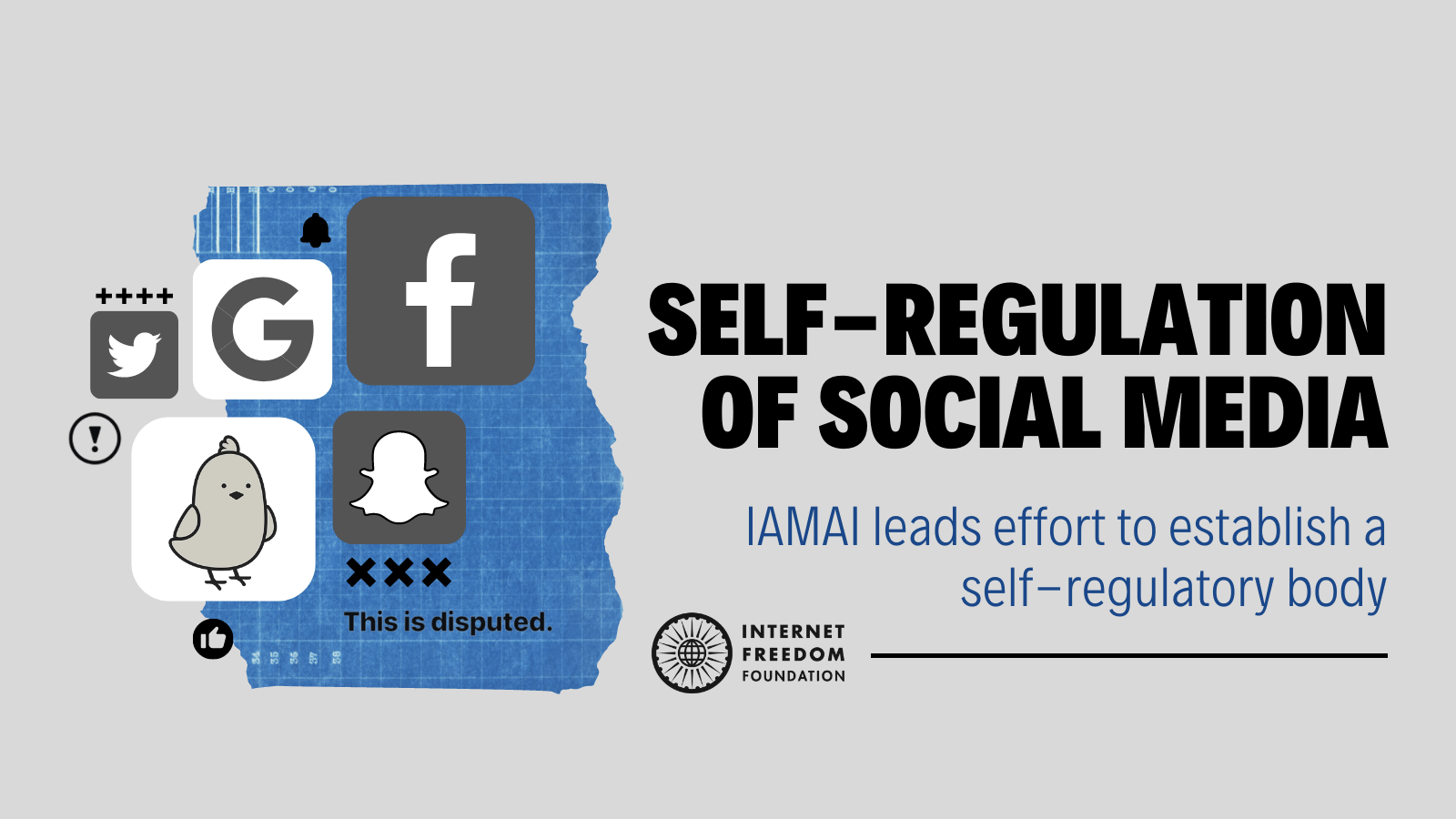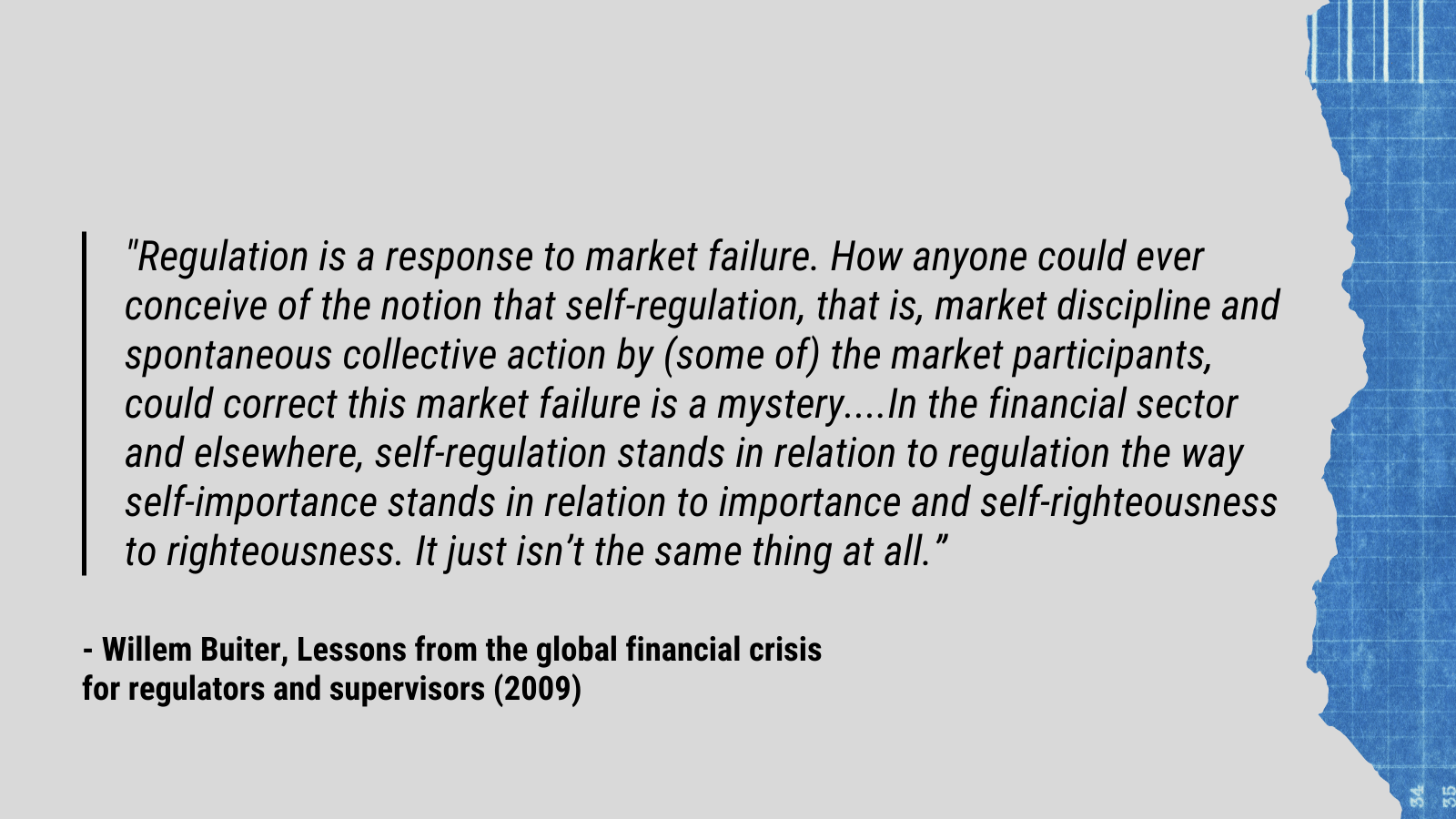
tl;dr
Recent reports suggest that efforts to establish a Self-Regulatory Grievance Redressal Board (“the Board”), led by the Internet and Mobile Association of India (“IAMAI”), is underway. Despite civil society and experts raising several concerns around such a self-regulatory mechanism, Meta (formerly Facebook) and Twitter have voiced support in favour of a Self-Regulatory Body (“SRB”), whereas Google expressed concerns. IFF has obtained a draft version of a “Code For Establishing A Self Regulatory Grievance Redressal Board” (“the draft Code”). We are making this draft Code public in the wider interest of the citizens of India.
Background
On August 11, 2022, Reuters reported that the proposal to create a SRB for the social media sector has garnered support from Facebook and Twitter. As per the report, Google, in a closed door meeting that included representatives from other technology companies, expressed its reservations with the proposal and that it was “unconvinced about the merits of a self-regulatory body”. An unnamed executive from the company revealed to Reuters that the creation of such a body would mean that external reviews by a SRB of the decisions taken by Google could force the latter to reinstate content, even if it violated Google's internal policies. Other than Google, which felt like this could lead to a “dangerous precedent”, Snap Inc and ShareChat also reportedly voiced concerns about a self-regulatory system, stating that such a decision required wider consultation, with involvement from civil society.
As reported by the Economic Times, the social media intermediaries as well as Internet and Mobile Association of India (“IAMAI”), which is responsible for leading efforts on the proposal, reportedly approached MeitY, seeking more time to put in place the “self-regulated Grievance Appellate Committee” .
Back in June, MeitY suggested the creation of a Grievance Appellate Committee (“GAC”) under the notified proposed amendments to the IT Rules, 2021, which could override the decisions of resident grievance officers that Significant Social Media Intermediaries (“SSMIs”) are required to appoint as per IT Rules, 2021. Departing from its stance of being open to an industry-wide SRB, recent reports suggest that the government may go ahead with the GAC in light of the questions raised on the inclusiveness of the SRB.
Source: “MeitY may stick with a govt-backed GAC for social media content issues” (Business Standard)
The creation of GAC itself does not have any legal basis as such adjudicatory bodies can only be constituted by the legislature. In absence of a law enacted by the Parliament empowering the executive, the GAC will be unconstitutional. In any case, any rule notified by the executive must be traceable to the parent act, which in this case is IT Act, 2000. However, the IT Act, 2000 does not contemplate appointment of any such committee. The executive-constituted committee will make the Union Government (instead of, ideally, an independent judicial or a regulatory body) the arbiter of permissible speech on the internet. It would incentivise social media platforms to suppress any speech that may not be palatable to the government, public officials, or those who can exert political pressure. Lastly, there is also a complete silence on whether this body will grant a right of hearing to content creators or even publish its orders.
A proposal for an industry-wide Self Regulatory Body (“SRB”) was suggested during a consultation on the Draft IT Rules Amendment, 2022 on 23rd June, 2022. In the consultation, several members of civil society including representatives of IFF were present.
During the meeting, as reported in the press subsequently a proposal for the creation of an industry wide SRB was mooted. As per a report in the Hindustan Times, the Ld. Minister of State, MeitY presiding over this consultation stated that “the government would be open to such a [self-regulatory] mechanism and would also be amenable to changes in the rules in case they were found to be more effective”.
The Code for Establishing a Self-Regulatory Grievance Redressal Board
In the interest of public awareness and transparency, we are making public the draft ‘Code for Establishing a Self-Regulatory Grievance Redressal Board’. IFF has redacted some personal information, converted the document into a pdf and removed some pages which consisted only of formatting logs. The efforts for this code are being led by the IAMAI as stated in the draft document. This draft document also provides the registered address of IAMAI as the headquarters of the ‘Self-Regulatory Grievance Redressal Board’ and states that “all official correspondence shall be addressed to the instant address”.
Composition of the Board
The draft document contains details on the composition of the Board, which consists of a Chairperson, three Expert Members, and three Signatory Members. The signatory members refer to senior executives employed at companies who will be the signatories to this Code. Both the Chairperson and the three Expert Members are supposed to be appointed by the Signatories to this Code by way of a simple majority.
Jurisdiction of the Board
The section on “Jurisdiction of the Board” elaborates upon the method to appeal a decision made by the Resident Grievance Officer of a Signatory under Rule 3(2)(a) and (b) of the IT Rules, 2021. If a user wishes to appeal a decision pertaining to the “removal or reinstatement of user accounts or information, data, or communication links uploaded by users”, they may appeal to the Board within a period of 30 days from the expiry of the timeline mentioned in the IT Rules for the disposal of the grievance. The section also mentions that the board will not entertain appeals on decision taken against content involving “(i) of a serious and egregious nature including content related to hate speech, child sexual abuse, terrorism, influence operations or content which has been actioned pursuant to Section 69A of the IT Act or (ii) uploaded by users with whom the intermediary has pre-existing commercial arrangements.” Some of these grounds for exclusion from appeal are concerning as they either aren’t cross-referenced to pre-existing legal definitions or they lack clarity in terms of their applicability. The scope of ‘pre-existing commercial arrangements are not clarified. The ambiguity and lack of definitions could translate into subjective application.
Powers of the Board
Under Rule 9(gg), the draft code provides that the Board shall pass a decision within 30 days of registration of a grievance. Such a decision shall either “dismiss the Registered Grievance with prejudice” or “find that the concerned signatory must either reinstate or block access to the user account(s)...”. The decision passed by the Board, shall include the specific URL identifying the information or content, reference of the Signatory’s terms of service which was applied to arrive at the decision and the reasons for passing the decision.
Lack of principles of natural justice
The draft Code states that the decision passed by the Board against a Signatory shall be binding in nature. Further, the draft Code mentions that the decision either has to be complied with within 10 working days or must communicate reasons for not complying in writing and approach a competent court. However, it does not provide for the decision to be communicated to the user who has registered the grievance.
Mysterious Secretariat
Further, there is lack of clarity in the composition, management, powers and checks of power in the “Secretariat”. The draft Code provides that the Secretariat shall handle the day to day activities of the Board including the composition of the Board. It also provides that the Secretariat shall initiate a call for a board member 60 days prior to expiry of tenure of any previous member.
Conclusion

We strongly oppose the creation of such an industry wide SRB. In today’s environment, self-regulation will lead to SMIs establishing extra caution and discretion in the case of politically controversial content, ultimately resulting in self-censorship and a vast chilling effect. Any efforts to self-regulate cannot be based on IT Rules, 2021 which restrict fundamental rights and are under challenge before the Supreme Court of India. Self-censorship has already been noticed with OTT platforms, where multiple shows on these on-demand video streaming platforms had been censored or cancelled in view of the IT Rules, 2021 before Constitutional Courts intervened. Any such model of regulation will likely have a substantial impact on citizens’ digital rights, result in economic harm, and also negatively impact freedom of speech and expression, and access to information.


